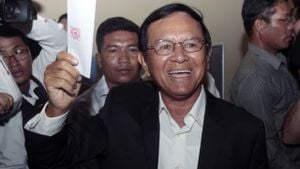Rapper Drake is no stranger to the limelight, but this time, his battles are echoing through the courts rather than just through lyrics. Recently, Drake, through his company Frozen Moments, filed petitions against Universal Music Group (UMG) and Spotify, claiming they conspired to inflate the streaming numbers of Kendrick Lamar's diss track, "Not Like Us." This conflict is just one part of the continuing lyrical feud between the two artists, which has been characterized by heated diss tracks and public exchanges.
The incendiary allegations stem from what Drake describes as unethical practices by UMG. According to the filed petition, the record label licensed Lamar's track to Spotify at significantly reduced rates, all as part of a scheme to boost its visibility and streams. Given the competitive nature of the music industry, these kinds of claims aren't merely whispers – they can reverberate through the industry, impacting careers and reputations.
Drake’s accusation implicates UMG and Spotify for using bots to artificially inflate the streaming numbers of "Not Like Us," which purportedly amassed over 900 million streams on Spotify alone. Other allegations suggest the use of payola – the controversial practice wherein promotional payments are made to radio stations to guarantee airtime for songs. These tactics, if confirmed, violate ethical standards and could have wide-reaching consequences not only for the companies involved but for the rap industry as well.
Despite the seriousness of these claims, UMG has rebuffed them, describing Drake's allegations as offensive and unfounded. A spokesperson emphasized their commitment to ethical marketing practices and asserted, "No amount of contrived and absurd legal arguments can mask the fact fans choose the music they want to hear." This sentiment reflects the larger narrative of fan agency, but it also highlights the tension between artists and the institutions supporting them.
But the lawsuit isn’t just about numbers and streams – it also plays directly to the longstanding rivalry between Drake and Kendrick Lamar. The heated exchanges between the two rappers have garnered attention not only for their lyrical prowess but for the captivating backstory behind their animosity. Drake has frequently rapped about UMG CEO Lucian Grainge and suggested his importance to the label, positioning himself as not just another artist but as someone integral to the success of the music conglomerate.
Adding another layer to this complicated situation, recent developments have also included Drake filing additional legal actions against UMG related to allegations of 'irregular and inappropriate business practices' aimed at securing airplay for Lamar's track. This includes claims of clandestine payments made to affiliates like iHeartMedia. Allegations of this nature could not only lead to reputational damage for the involved parties but also expose potential illegal practices within the larger artist-promotion ecosystem.
The legal confrontations reveal the underlying currents of competition within the hip-hop community, especially as Lamar recently released his highly anticipated album, "GNX," with references to his rivalry with Drake woven throughout the lyrics. His track “Not Like Us” is particularly notable, as it stands as both a professional achievement and the center of this legal whirlwind.
Funk Flex, renowned DJ and radio host, has thrown his support behind Drake, emphasizing the necessity of the conversation surrounding payola and streaming transparency. Through his public statements, he has indicated it’s imperative for artists to maintain integrity and clarity within the industry and has pointed out the troubling influence of money on what listeners hear. Flex's endorsement brings attention to the significant ramifications of these disputes, not only for Drake but for the entire framework of the hip-hop scene.
The impacts of these developments are just beginning to unfurl. Kendrick's upcoming performance at the Super Bowl LIX halftime show is scheduled for February 2025, raising the stakes even higher. Suspicions swirl around the possible consequences for Drake if Kendrick plays "Not Like Us" during the event, especially considering the rapid escalation of this feud. If Kendrick’s performance is well-received, it could overshadow Drake’s illustrious career and highlight the tensions underpinning hip-hop’s competitive nature.
While some speculate Drake’s lawsuit attempts to prevent Kendrick from performing at the Super Bowl, it also shines light on the broader issues within the industry, including the transparency of streaming practices and the marketing strategies utilized by major labels. Although UMG maintains its professionalism, questions linger around their actual practices, especially amid mounting allegations from high-profile artists.
Music fans both inside and outside the hip-hop community are watching closely as the legal disputes continue. The outcome could redefine the rules of engagement within the music industry, potentially signaling to all artists – from aspiring talent to megastars – how to navigate their own relationships with the industry and the ethics surrounding it. For now, the saga is far from over; tensions remain palpable, and as the year draws to a close, the stakes are bound to rise.



